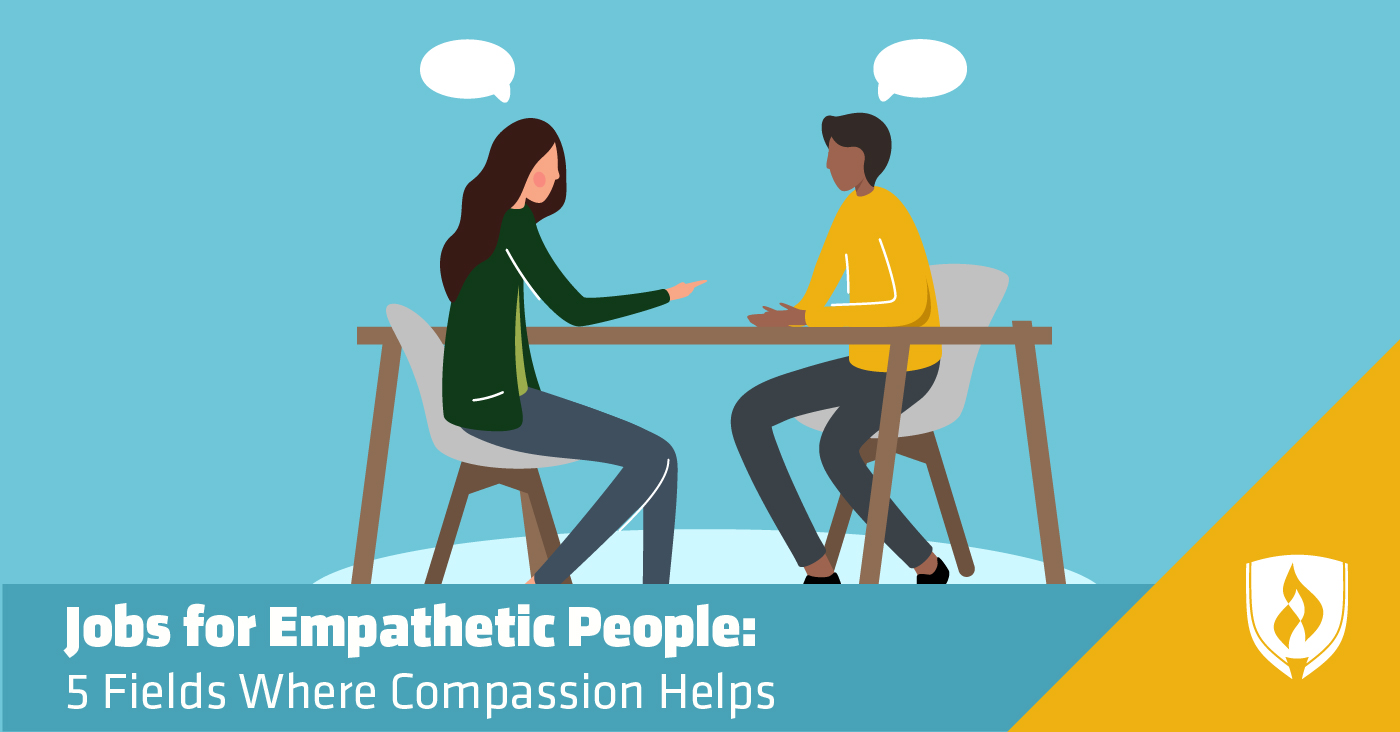Do you sense the feelings of those around you? When your coworker is having a bad day, can you feel their frustration and find a way to relate to them? Or maybe you were always the type to initiate friendly conversation when you spotted someone eating lunch alone in the cafeteria.

The ability to remain in touch with your emotions and to tap into the feelings of the people around you can be rewarding on a number of levels. It can lead to deeper personal relationships, heightened creativity and even an increased sense of beauty.
But being empathetic can also be really taxing—especially in the workplace. When there is no outlet for the emotions you feel, they can start to bottle up or feel wasted.
What you might not know is there are plenty of careers in which empathy can actually be a strength. We talked to empaths and career experts alike to figure out which careers are best for those with high emotional intelligence. Read on to discover five potential paths in which you could use your empathy as a marketable skill.
5 Fields that could put your empathy to work
While empathy can be valuable in nearly any role, these career fields in particular leverage your ability to relate to others.
1. Marketing
When an empath senses someone’s pain or frustration, their compassion kicks into gear and they immediately want to alleviate those negative feelings as best as they can. And while this tendency can often go unappreciated in bottom-line focused business settings, not all business-related jobs are stifling to people who are empathetic.
Michael Alexis, director of marketing at Museum Hack, sees marketing as an ideal field for people with high emotional intelligence. “Some empathetic people will shy away from marketing or not see it as a compassionate profession,” he says. But Alexis explains that if you’re working on behalf of a quality product or service that will truly benefit others, your role in marketing or sales can actually help them improve their lives.
Stacy Caprio, founder of Accelerated Growth Marketing, agrees that marketing needs more empathetic people. Empaths, she suggests, are often able to think about what’s best for others. “To create a successful ad or campaign, you need to be able to put yourself in the shoes and mindset of your ideal customer, and then tailor the ad to appeal to what they want.”
Marketing isn’t just about highlighting the unique features of a product or service—to really hit home you need to understand the concerns and motivations that pushed customers to even consider what you’re selling in the first place.
If you can envision yourself thriving in a marketing career, learn more about what you can expect in our article “What Do Marketers Do? A Closer Look at the Job Description.”
2. UX (User Experience) Design
Imagine your favorite app—for this example, let’s say it’s the one for your local coffee shop. You’re accustomed to logging in and seeing a pastel-colored screen with a subtle coffee bean design. Then you head to the sleek homepage, which boasts all the options you need for ordering your usual vanilla latte sprinkled with cinnamon.
Before this app got to you, people behind the scenes carefully considered each and every design element by putting themselves in your shoes, wondering what a customer like you might want from a coffee shop app—inviting colors, simple navigation, all the information you need to quickly order your usual drink or to go out on a limb and try something new.
One of the most integral people in that process is called a UX designer. These professionals are responsible for curating the experience you have when you interact with an app, a website, a video game or even a pair of headphones. They try to anticipate your desires and create a smooth user experience based on those feelings.
“My job allows me to make empathy maps so I can get into a user’s shoes,” says UX designer Beck Beach. “UX design is all about helping to make people’s jobs easier.”
This is an excellent option for any empathetic person with an eye for strong design—you’re not just trying to make things look nice, you’re trying to make things look nice while being highly functional.
If you can envision yourself thriving in a UX design career, learn more about what you can expect in our article “Everything You Need to Get Started in User Experience Design.”
3. Counseling
Another key element common to empathy is the ability to detect when a person is just feeling off. This is also a trait some of the most effective counselors and therapists share, as they are often tasked with distinguishing when a client’s external emotions do not match those stirring beneath the surface.
Whether it’s denial or avoidance, people can often have a hard time acknowledging their real feelings. Counselors use their empathetic reasoning to understand where a client is coming from and help determine the things going on in their life that may be having a notable impact.
“You cannot expect every therapist to have experienced every trauma possible, and yet they know how to respond to their patients,” explains Rebecca Beltran, an advancement associate with Paws for Purple Hearts. This is where their sense of empathy becomes key.
In other words, even though a counselor may not have direct experience with the difficult feelings that come with the loss of a child or a complicated divorce, they can still detect the presence of deeper emotions, help bring them to the surface and offer strategies for coping.
“Empathy is a skill,” Beltran says, adding that when it comes to counselors and therapists, “emotional intelligence is irreplaceable.”
4. Healthcare
When a little boy breaks his arm after attempting to master the monkey bars at recess, he is not just in physical pain. He may also be feeling scared and possibly even a little ashamed for falling. A good doctor will set the break and send him on his way—but great healthcare professionals will go the extra mile in addressing how the patient feels, doing what they can to ease some of their fears or concerns.
Whether you opt to pursue a career as an ER nurse, a family practitioner, a neurosurgeon or a medical assistant, working in healthcare could give you an opportunity to encounter people with a wide variety of physical and emotional needs. As an empathetic person, relating to your patients with kindness and understanding could make you an exceptional healthcare professional.
If you can envision yourself thriving in a healthcare career, learn more about what you can expect in our article “7 Compelling Reasons to Consider Working in the Healthcare Industry.”
5. Education
If you’ve ever had a really good teacher, you know that teaching is more than just following a curriculum. From day to day, the mood of a classroom can change. One day, students are tired and unengaged. Other days, they are antsy and distracted. An empathetic teacher will be able to read the feelings in the room and adjust their lessons or teaching style accordingly.
“Empathy is key to being an effective educator; an educator needs to understand the needs of their students,” explains Viktor Sander, behavioral scientist and coach at SocialPro. “That connection builds robust teacher-student relationships, which makes students eager to learn from their teacher.”
Empathetic teachers tend to create dynamic classrooms while also using their compassionate nature to form better relationships with their students. If a student is struggling with homework, for example, an empathetic teacher may be able to discern whether that student is struggling with the material or possibly struggling with something at home or outside of school.
If you have a passion for learning new things and passing on your knowledge, consider going into education. Your sense of empathy could help you succeed in ways far beyond just delivering a good lesson.
If you can envision yourself thriving in a teaching career, learn more about what you can expect in our article “Would I Be a Good Teacher? 6 Questions to Consider Before Working with Kids.”
Feel good in a meaningful career
If you were worried that empathy and compassion are skills wasted in the job market, you can rest easy knowing that your keen sense of emotional intelligence and kindness can help you thrive in some of the most fulfilling and meaningful career options out there.
If you’re still unsure of which direction you’d like to steer your career aspirations, Rasmussen College’s Career Aptitude Test can help you start narrowing down your options.
Rasmussen College does not offer programs to prepare students for every occupation profiled in this article; please see rasmussen.edu/degrees for a list of the programs we offer.




